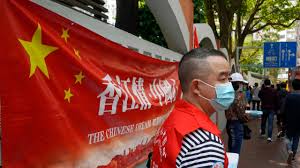Chinese lawmakers on Thursday approved a proposal that gives Beijing complete control over Hong Kong elections. The vote was unanimous with one abstention.
If the proposal becomes law, all political candidates and election winners in Hong Kong will have to confirm their loyalty to the Chinese Communist Party (CCP).
The goal is to ensure that only “patriots” govern Hong Kong, said Chinese officials.
“We are not speaking about creating a monolithic government,” said Chinese Foreign Ministry spokesman Song Ru’an. “We understand that Hong Kong is a plural society with a blend of Chinese and Western culture…When we talk about patriotism, we are not talking about the abstraction of loving a cultural or historical China, but rather loving the currently existing People’s Republic of China under the leadership of the Chinese Communist Party.”
In addition to vetting candidates, the proposal directly limits the power of elected officials currently in office by adding 20 unelected seats to Hong Kong’s Legislative Council. As it stands, the Legislative Council consists of 35 elected officials and 35 officials selected by industries, unions, and other professions (i.e. selected by the CCP).
“We are improving the electoral system by making sure that whoever is governing and administering Hong Kong in the future is somebody who loves the country, who loves Hong Kong,” said Hong Kong’s Chief Executive, Carrie Lam.
What this means is that opposition candidates won’t be able to join Hong Kong’s Legislative Council even if the general public supports them, explains Steve Tsang, an expert on Hong Kong politics at the London-based SOAS China Institute. “This is important because it reverses the direction of political development in Hong Kong set by the British before the end of the colonial era.”
—
The takeover of Hong Kong’s electoral system is the culmination of a dispute that began in April 2019 when Hong Kong’s pro-China government introduced a bill that would have allowed Hongkongers suspected of a crime to be extradited to China.
More than 1 million people took to the streets in June to protest the bill, understanding that China would use it to silence political dissent.
The protest was met with violence from the police, which spurred an even larger demonstration.
Over the next several months, the protests and riots evolved into a full-blown movement demanding democracy, an investigation into police brutality, and the resignation of Carrie Lam. Pro-democracy candidates won local elections with overwhelming support and for a brief moment Hong Kong seemed on the verge of claiming a degree of independence from mainland China.
Hong Kong’s hopes left in May 2020 when China imposed a national security law allowing its own security agencies to operate in Hong Kong. Police arrested anyone guilty of “subversion,” “secession,” or “collusion with foreign forces” and the government postponed legislative elections for at least a year.
If the elections end up taking place, they will be anything but democratic.
“The Chinese Communist Party has shown the world once again that it cannot be trusted,” argues Chris Patten, the last British governor of Hong Kong. “It is a continuing and brutal danger to all who believe in free and open societies.”
Author’s Note: As we wrote months ago, China is stopping at nothing to achieve complete control over Hong Kong and nobody is going to stop them. We can expect Taiwan to be next.
Sources:
China’s parliament endorses plan to ‘improve’ Hong Kong elections, further curbing opposition
Beijing Adopts Plan to Control Hong Kong Elections
China All but Ends Hong Kong Democracy With ‘Patriots Only’ Rule
